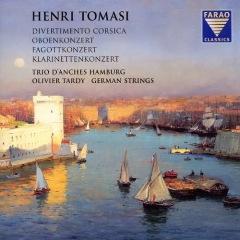Henri Tomasi - Wind Concertos (2011)
Henri Tomasi - Wind Concertos (2011)

Divertimento Corsica 1. I. Paghiella 2. II. Cimetière marin 3. III. Danse-Sérénade 4 IV. La Foire du Niolo 5. Concerto pour hautbois et orchestre de chambre Concerto pour basson et orchestre de chambre 6. I. Andante et Allegro 7. II. Sérénade nocturne 8. III. Final - Saltarelle Concerto pour clarinette et orchestre à cordes 9. I. Allegro giocoso 10. II. Nocturne 11. III. Scherzo final Rupert Wachter, clarinet Christian Kunert, bassoon Nicolas Thiébaud, oboe German String Orchestra Olivier Tardy – conductor
Although the French composer Henri Tomasi (1901-1971) started practicing his trade at an early age, it was only after winning the "Prix de Rome" in 1927 that he started to take his rightful place among the foremost French composers of the time. Still, only after the Second World War was he able to unleash his full creative powers. A composer with a leaning for lyric stage-works, Tomasi applied himself in equal measure to the concerto genre. He wrote 20 such pieces in collaboration with the most celebrated soloists of the time, and the works presented on this recording were composed between 1952 and 1961, at a time when Tomasi brought his conducting career to an end to concentrate more on composition.
The clarinet and bassoon concertos were commissioned by the Paris Conservatoire to serve as audition pieces, and both are in the traditional 3-movement structure. In contrast, the Oboe concerto is only in one movement and develops in a programmatic way based on a text by the architect André Boll relating the escapades of a group of young maidens who steal away from a procession on the Day of Atonement to pass the night in a satanic ritual dance. At daybreak they are petrified through God's wrath.
All three works belong to Tomasi's second period of composition when he was still writing in a lyrical and somewhat tuneful vein. "Divertimento Corsica" is a descriptive and picturesque four-movement piece full of dances and melodies reminiscent of the composer's beloved island, which was the home of his forefathers, and for which he had a strong natural predilection; indeed it was one of his favourite sources of inspiration.
Although this is relatively new music to the repertoire, performances by members of Trio d'anches Hamburg are wholly committed, and the many virtuosic moments are handled with assurance, agility and aplomb. This is an enterprising issue in top-drawer sound and presentation, worthy of the most serious of considerations. --- Gerald Fenech, classical.net
download: uploaded yandex 4shared mediafire solidfiles mega filecloudio nornar ziddu








